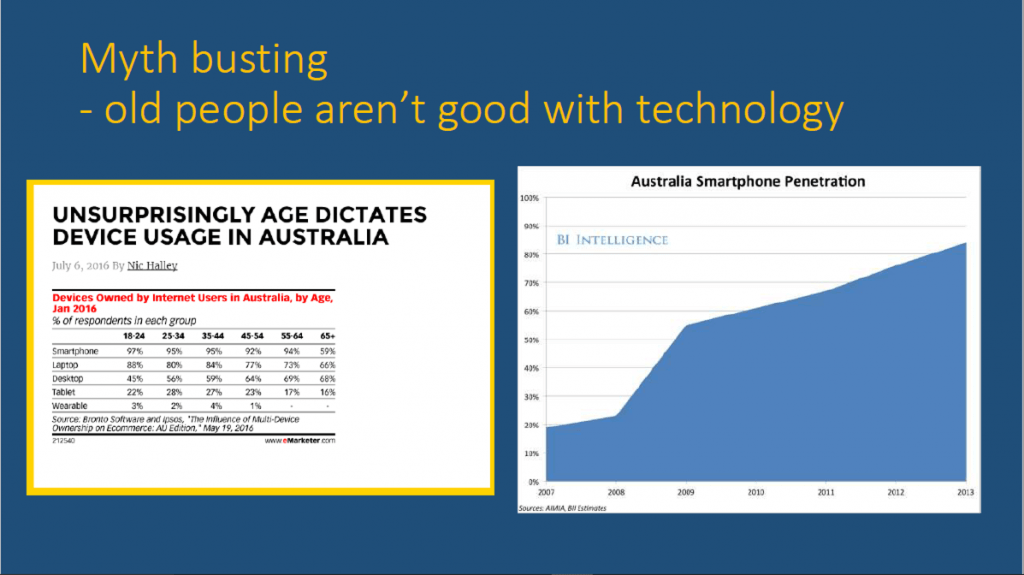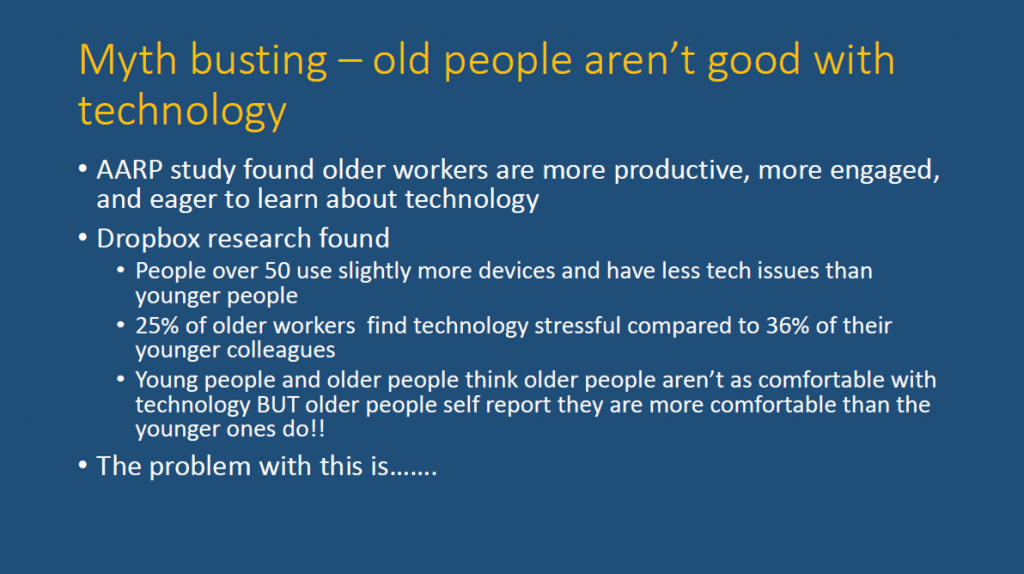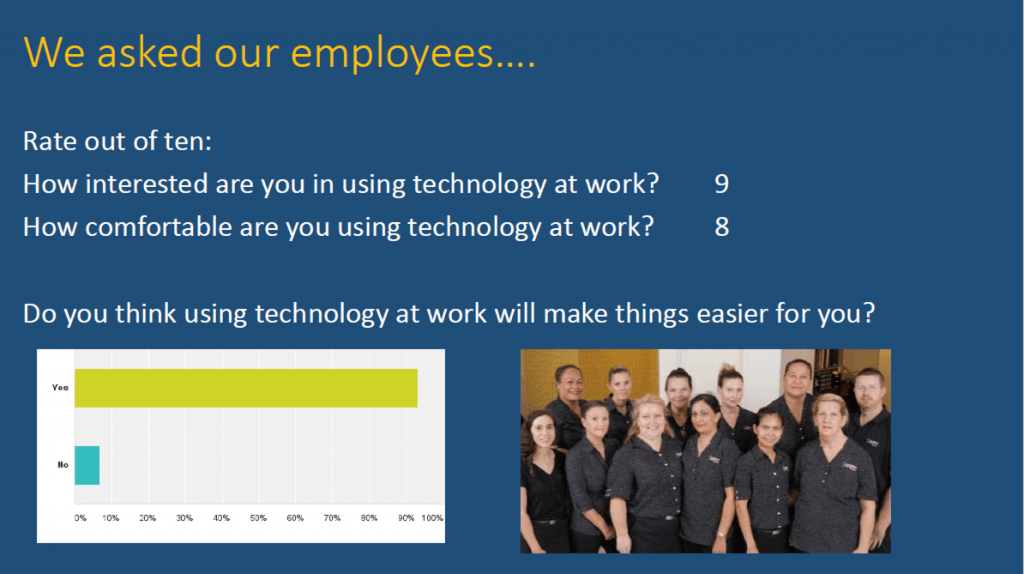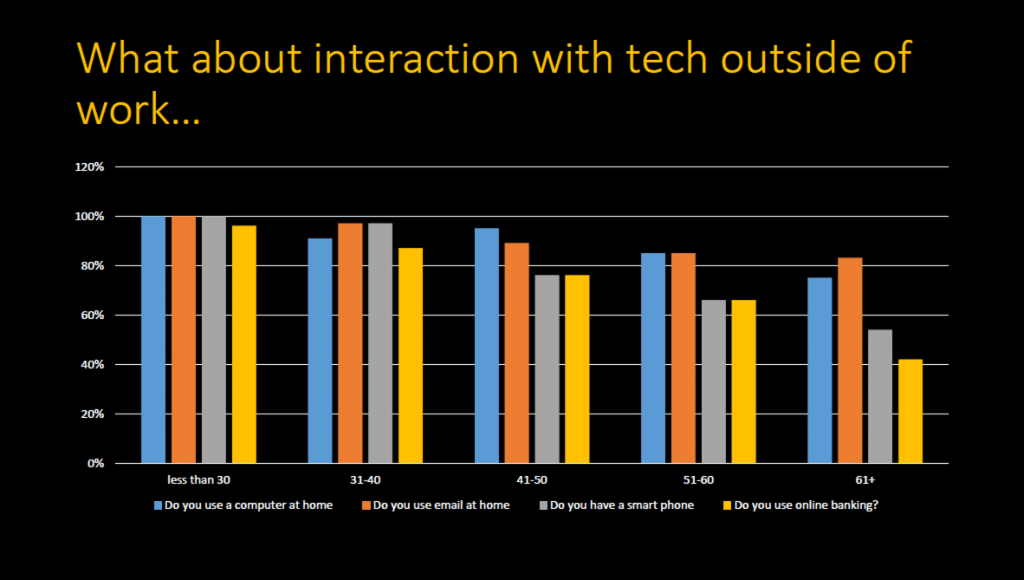Myth Busting: An Older Workforce Can't Use HR Technology
)
You can't teach an old dog new tricks. Older people in the workforce are stuck in their ways and won't embrace new technology. These seem to be some of the attitudes surrounding our ageing workforce that are prevalent today. But are they true?
With an increasingly ageing workforce and technology becoming not just an enabler of business but a way of working, there's an increasing demand for workers of all ages to embrace technology.
But does your age have anything to do with how willing or able you are to take up new technologies?
During her presentation at HR Tech Fest 2016, Kaleena Jefferson GM People and Culture at Southern Cross Care busted this myth wide open. While they thought they'd have a challenge on their hands getting their mature workforce to embrace HR technology (almost a third of their workforce is aged 55+ with their oldest member in their 80s), they were pleasantly surprised at the results.
In this excerpt from her presentation, she reveals some fascinating results from their technology survey that may change your attitude towards older workers and technology use.
Transcript
Then I had the problem of “Well, we've got all this older workforce that don't use email. What am I going to do about that problem?â€' I did some more research, there's quite a lot of interesting research about this actually, and what you can see here on the left-hand side is that in the 45 to 64 age group there's still 94% of people that actually have smartphones. I thought, “Well, this is promising. If you've got a smartphone, hopefully that means you can use an app, hopefully,â€' and then I can also see here in 2013, you could see the uptake of smartphones was really positive, so I thought, “Okay, this is good. If they've got a smartphone, then we might be able to do something.â€' The other thing with Halogen actually is that it is mobile; we haven't put mobile in yet, but mobile has got fantastic mobile modules as part of it.

Then I found another really great study. Have you guys seen this Dropbox study? It's really cool, they asked young and old workers about how comfortable they felt using technology, and what AARP found is that older workers are more productive, more engaged and more eager to learn. Isn't that interesting? And Dropbox found that people over 50 have more devices – and actually, I've noticed that in the room by the way that there are a number of people with multiple devices, like an iPad stacked on top of a phone – and that 25% of older workers find technology stressful, compared to 36% of younger workers. The reason they think that is that younger workers are more frustrated by the technology at work, which makes sense, right, because it doesn't work properly and it's not quick enough and it hasn't got the latest stuff. But young people and old people both think that older people aren't so good.

So, what's really interesting is the whole problem is actually an attitude problem, not a capability problem, and then what that means is that really we're talking about good old change management principles when it comes to introducing technology to older workers, so I thought, “Okay, that's good.â€' Then I thought, “Well, we better ask our employees,â€' so I put out a survey. I was clever, I put it out online and through SurveyMonkey and I also printed it and sent envelopes, and I wanted to understand what attitudes were, to see what the attitudes of our workforce was about technology and to see what kind of base I had to work from.
What I found is that “How interested are you?â€' and they said, “9 out of 10,â€' so that's good, that's positive. How comfortable? Eight, and I thought, “Okay, that's good too, good start,â€' and then I said, “Do you think using technology at work will make things easier for you?â€' and as you can see overwhelmingly people said, “Yes.â€' I will be sharing this obviously with them as we go, but I thought, “Okay, we've got a good place to start.â€'

Then I thought, “Let's find out what they're doing at home and how capable they might be?â€' so I said, “Do you use email at home?â€' and more than 90% said yes. “Have you got a smartphone?â€' just under 90%, and I love this “Do you use online banking?â€' Only 80%, which would be trust, that they don't trust online banking, so I thought that was interesting.
.png)
This won't surprise you: the left-hand side is the younger people, right through to the older people, and this is about “Do you use computer at home and email at home? Do you have a smartphone? Do you use online banking?â€' Not surprisingly it goes down with age, and this is in our workforce. Then I said, “What single thing would make you feel more comfortable about using technology at work?â€' and this is really interesting. You can see that the people under 40 said that they would want time to play with the technology, it was their number one thing, then followed by face-to-face training. The people between 40 and 60 said they wanted face-to-face training and then some time to play, and the people over 60 wanted one-on-one coaching. Isn't that interesting?
So, I thought, “Wow, this is telling me how important it is that I have a mixed mode of the way that we approach our technology development,â€' and in fact probably all kinds of learning in our workforce, given that everything we're teaching them has a technology component anyway. So, I found this really, really interesting.
About the Speaker

Kalena Jefferson is GM People and Culture at Southern Cross Care. Working across a range of organisations she has designed, developed and implemented performance enhancing and capability building programs, tailored to each organisation's strategy and direction. She has done this successfully in fast paced results and performance driven environments and made change in organisations where culturally performance, targets and results were dirty words!!
.png)
